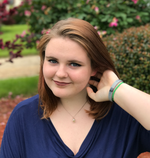 Eilis S. | Junior | Team: 4750 | Lesbian | 2017 – Present What do you do on your team? I am safety captain as well as a member of mechanical and one of the business leads. Why did you join LGBTQ+ of FIRST? I joined LGBTQ+ of FIRST because it was an organization centered around the reason of why I joined robotics in the first place- making spaces LGBT+ safe. Recommend a book, movie, album, podcast, etc. to us. By far, my favorite album at the moment is Spiritual Dark Age by To Kill a King! Tessa B. | Senior| Team: 1339 | Female | MtF | Lesbian | 2017 – Present
Why did you join LGBTQ+ of FIRST? I joined because I wanted to be a part of the LGBTQ+ community in FIRST and give back to the community that has given so much to me. What are your goals for the future? My biggest over-arching goal is to get a degree in computer science and/or aerospace engineering and get a job at SpaceX, Tesla, or some other technology company. Recommend a book, movie, album, podcast, etc. to us. Digital Fortress by Dan Brown is one of my favorite books of all time. Alex N. | Alumni| Team: 2791 | Male | Pansexual| 2017 – Present
How did you get involved in FIRST? I was nine when my mom brought me to the NYC Regional for the first time; her friend was volunteering that year. Robots sped around a circular track, tossing balls the size of me – the game was FIRST Overdrive. Donning goggles for the first time, I entered the pits and marveled at the robots, but what caught my eye were the people building them – kids, not too much older than myself. From that moment on, I knew this was what I wanted. Stepping out of the pits, a blur of denim and a Segway sped past me. I hadn’t realized it at the time, but I’d just met Dean Kamen. Fast forwards eight years later, to 2016, and I’ve high-fived Mr. Kamen’s mother without realizing it at the South Florida Regional. (Long story short, there was a mosh pit turned conga line involved.) What is your favorite experience with LGBTQ+ of FIRST? It’s a small world. It really is. The most important moment, to me, was when I joined the Discord server and realized that there were people that I’d met in person at competitions years ago; the community was bigger than I could’ve ever hoped. Even today, as an alumnus, I meet folks who’d been involved in FIRST and the fact that we can pick up and talk about our experiences like old friends floors me every time. What is one cool thing you’ve learned lately? Blue’s a rare color in nature. There’s really not any truly blue fruits (come on, blueberries are purple at best) and blue flowers are not as common as, let’s say, red flowers. Why? I mean, aside from the fact that blue’s not a great color for camouflage because it’s so rare, that is. Chemically, blue is a hard pigment to produce and few creatures do it. The ones that do appear blue seem iridescent (think of the blue on many birds) and it’s because they don’t do it chemically, they do it physically. Their feathers/scales/tissues are structured (many of these structures look like little combs) at the microscopic level to diffract light in such a way that all the other colors experience destructive interference and thus, cancel out. Final fun fact: I learned about this while my hair was dyed blue. 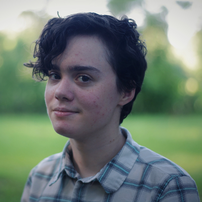 Zeph L. | Alumni | Gay | 2017 – Present Why did you join LGBTQ+ of FIRST? I was already an adult volunteer when I found out about LGBTQ+ of FIRST, but I thought it was a really cool resource with a lot of potential to help FIRST students struggling with their sexuality or gender identity. I know it would have been helpful for me as a student. What are you most looking forward to this competition season? I’m really looking forward to being a referee at the FIRST Tech Challenge South Super Regional- I’ve really enjoyed seeing the different FTC designs this season and I look forward to seeing many more. What is one cool thing you’ve learned lately? I’ve been doing a lot of research on frogs, and I now know a lot about frog teeth. Most frog species have teeth on their upper jaws, but one species has sharp teeth on both the upper and lower jaws. 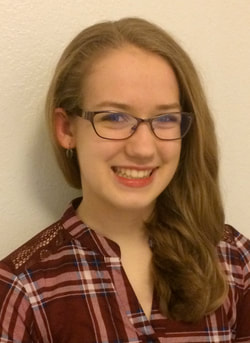 Katie J. | Junior | Team: 3595 (FTC) | PNW | Gay | 2017 – Present What do you do on your team? I’m the team captain of FTC 3595. I’m involved with every aspect of the team, from building and programming to outreach and documentation. Why did you join LGBTQ+ of FIRST? I’d admired the organization from afar ever since it began. I’m truly passionate about LGBTQ+ of FIRST’s mission, and when I saw that staff applications were open I was beyond excited by the possibility of getting involved and giving back to the organization. What are you most looking forward to this competition season? Because I’m in FTC, the competition season started a few months ago for me. My favorite thing so far has been meeting all of the new teams and volunteers at events — I moved from Alaska to Virginia over the summer, so this season I’m seeing a completely different group of people, and it’s been very fun to get to know everyone! I have been involved with FIRST for ten years now. My first brush with it was at a summer camp held by an FIRST LEGO League team – my mother had to make me go, and I’m glad she did. After ‘aging out’ of FLL, I joined a FIRST Tech Challenge team and continued with the FTC program until I graduated, as well as staying involved as an active volunteer with FLL. FIRST has changed my life, given me experiences I would have never had the opportunity for otherwise, and given me an amazing community that I’m proud to be a part of.
My last couple years in high school I began to struggle with my gender identity. I can’t say that that was the beginning of my questioning, but that’s when I really began to have to accept things about myself and figure out words to put to my experiences. As I slowly started to come to terms with being transgender, I also slowly began to feel more alienated in a lot of spaces . I wrestled with the idea of ostracised if I came out, and of losing communities that meant a lot to me- namely the FIRST community. I didn’t really feel as if I felt a part of anything outside of FIRST. By the time I was ready to come out, I had graduated high school and was promoted to a key volunteer role in the same state I grew up in, and also served at the Super Regional and World Championship levels. And I was terrified to tell anyone the truth. I was part of enough circles and relatively tight communities that I knew I would be facing a lot of scrutiny, and the idea of being harshly judged in places that meant so much to me was a heavy prospect. When I finally came out to my parents, I told them that they could tell anyone else they wanted, as long as they weren’t people in FIRST circles. It was a very difficult time in my life. Looking back now, I wish I had come out sooner, because the support and acceptance I have found in my FIRST community has been more than I ever expected. Reactions and adjustments from mentors and fellow volunteers have varied, but overall the positive reception has been wonderful. FIRST headquarters have worked with me to make sure my volunteer registration account was correct, and has been very thoughtful with housing accommodations for me as a transgender individual as I took a larger role in the FIRST volunteer world. One reason that I feel as if what LGBTQ+ of FIRST is doing is so important is because I know that coming out would have been easier if I had seen other transgender people- or even gay, lesbian or bisexual people- being visibly accepted in FIRST spaces and known that I had one less thing to fear. I now know many, and I am thankful for that. FIRST as an organization encourages diversity and acceptance, and I am glad that in the last few years a push has been made to make sure that the LGBT community is included in that. Being an LGBT adolescent is difficult, and it is my sincere hope that the FIRST community is a haven for more of these young people than it is an additional stressor. For anyone who is wrestling with similar circumstances as I did, I hope you are able to make that step soon. Whether you are a student, a volunteer or a mentor, there are people behind you and people next to you who want you to be able to live your most genuine life. This was written by a contributor to LGBTQ+ of FIRST who would prefer not to be named. On February 24, you can also find staff members at both the Virginia and Georgia FTC State Championships!
Find us at over 40 events this FIRST Competition season! Learn more about who will be there and more from our attendance spreadsheet! Feel free to contact us with any questions at [email protected]! Here’s our re-designed general brochure! Feel free to print! You can download it here: Brochure-1211 – g If you’re interested in using our brochures, we’d love for you to let us know how it went – and for you to get more involved! Email us at [email protected]!
Recently, an admin from LGBTQ+ of FIRST interviewed Tim’m West about LGBTQ+ representation and education in schools. Here’s what he had to say:
Please give a short introduction for people who may not know you. My name is Tim’m West; professionally and formally I lead Teach For America’s LGBTQ Community initiative. I am a longtime educator, youth advocate, and on the side I do some poetry and hip hop. What brought you to LGBTQ+ activism? I think namely my own personal experience. I grew up a queer kid in the 80’s in southwest Arkansas, and, for me, there weren’t positive queer role models. The only mentions of LGBTQ were negative. For me, the dearth of mirrors to see myself, the absence of LGBTQ people made a difference in how I saw myself. It made me want to teach. I felt that as a teacher I could contribute to making schools a space where students did see you and see that a black queer accomplished man existed and feel you are pretty awesome for that truth. Beyond teaching, that was really important work to do where representation is concerned. I went to school to study philosophy. I thought I would be a college professor, but I ended up leaving my PhD program, and I had two Masters degrees in rather obscure humanities areas, if at good institutions (The New School, Stanford). I got a job running an English department in a high school, so I fell into teaching youth and supporting their academic and social emotional development. Being around youth and understanding their challenges encouraged me to be a better example for them by bringing myself more fully into educational spaces. I have done that in schools as a man who is queer, and I have done that in schools as a man who is HIV positive, which sometimes leads to pushback like, “ooh students don’t need to know that about your personal life”. Still, I’ve taught in places that have high HIV incidence and prevalence. I’d be remiss not to share my own personal experience with them as a way of motivating sexual and emotional safety. What do you see as being the value of LGBTQ+ representation in schools in terms of the teachers? There’s been a lot of data [on the effects of representation], though not a lot of it has been done on the LGBTQ community. For example, in the African American community—and I can say this as an African American who had maybe one African American male teacher in all my schooling—it affected me to not seeing myself represented among the people who are teaching. There have been recent studies that show that students who see themselves represented do better. It’s connected to the reality that less than 2% of teachers in the US are African American men. Yet we know the representation of black boys in public schools is far higher. It actually just creates a situation where people who might be able to best connect and reach students aren’t present. Ultimately, it’s not to say a student can’t learn from anybody, but I think identity and how people see themselves is shaped by those who teach them. So if you’re LGBTQ and you don’t see any teachers or administrators identify that way, it sends a message, an implicit message that you LGBTQ people don’t belong in the places entrusted with our learning; or that if they exist in that space, they’d better be quiet about it. I think connotes a problematic idea of shame; that being LGBTQ is not something that you should be proud of. Being out as a queer teacher is not about the material being any different. What harm is there in knowing that a science or history teacher might be LGBTQ just as we know or assume our teachers are straight? One’s orientation might actually inform something unique about their approaches to teaching or world view. I think that’s important for students to see and experience. How can LGBTQ+ lessons be integrated into the classroom? I have an interesting belief in this, because I don’t believe that LGBTQ issues should be brought into the class independent of the need for rigorous content. By having an LGBTQ lesson, you’re tokenizing our identity as opposed to normalizing our identity. Why, if you’re talking about quantum physics, and let’s just say an important person in that field happens to be LGBTQ, is it a bad thing to mention that in the context of their innovation? It might be interesting for people to know that. If you’re looking at biology for example, why can’t there be discussions about gender or intersex people, or the myth that XX and XY pairings are the only and there isn’t biological and chromosomal diversity beyond that? It’s just bad science. There are ways to talk about LGBTQ issues and ideas that are not tokenistic. Content and culture can enable strong learning and aren’t oppositional. We don’t have to say: “let’s take a break from our real work and talk about LGBTQ people”. I’d say the same thing about exposure to different cultures; it’s not helpful to say: “let’s talk about black people for 10 minutes”. What are the major roadblocks to LGBTQ+ education in schools? I think you have different generations of people that haven’t had the exposure. Often, what I find in schools is that it’s not predominantly students who are creating difficult challenges for queer and transgender kids, it’s the teachers who have been there forever who refuse to divorce their personal biases from their teaching. A good example of that is when I taught rhetoric at a conservative school in suburban Texas, and I had to help students write anti-gay marriage papers. Did I like to do that? No. But it was my job as a teacher to help them question their beliefs and, sometimes, help them craft as strong an argument as possible against something I felt strongly about. It’s not my job to convince my students to believe the way I do. It is my job to create a safe arena for the development and maturation of students’ opinions and thoughts. The role of a strong teacher in school is to create that setting and environment. Unfortunately, according to the data we see, LGBTQ students are not safe in high schools. They face a lot more harassment, they drop out at higher rates, truancy rates are higher, any number of indicators. How can non-LGBTQ+ teachers be good allies? I think one not to hypervisibilize LGBT students by treating them different that others, but to truly be committed to creating a classroom environment where ALL students feel like they have something to contribute to the class. Some of that is about intentionality and exposure. In your curriculum, is there something that can speak to the diverse background and experiences in class? Teachers who do that really well are really appreciated by students. It’s like, “oh wow — this is not just about the specific academic topic, but we’re also learning about ourselves and the people around us.” It’s important for student development. Otherwise, teachers should be good allies to queer and trans kids because it’s their job (that’s the smart-ass answer). It’s not about whether or not you want to support LGBTQ students. As a teacher, should be fully committed to the education of your students. Truly being committed means that you advance a classroom culture where anti-LGBTQ microagressions aren’t tolerated; where all students feel safe in your class and not harassed, because that can ultimately impact their ability to learn well. Students feeling safe to learn, or not, is a reflection on you as a teacher. |
About LGBTQ+ of FIRST
LGBTQ+ of FIRST is a student run organization that advocates awareness and acceptance of LGBTQ+ students, mentors, and volunteers of FIRST Robotics. LGBTQ+ of FIRST reaches out to over 1000 members across the FIRST regions and fronts multiple outreach endeavors. Archives
June 2024
Categories
All
|

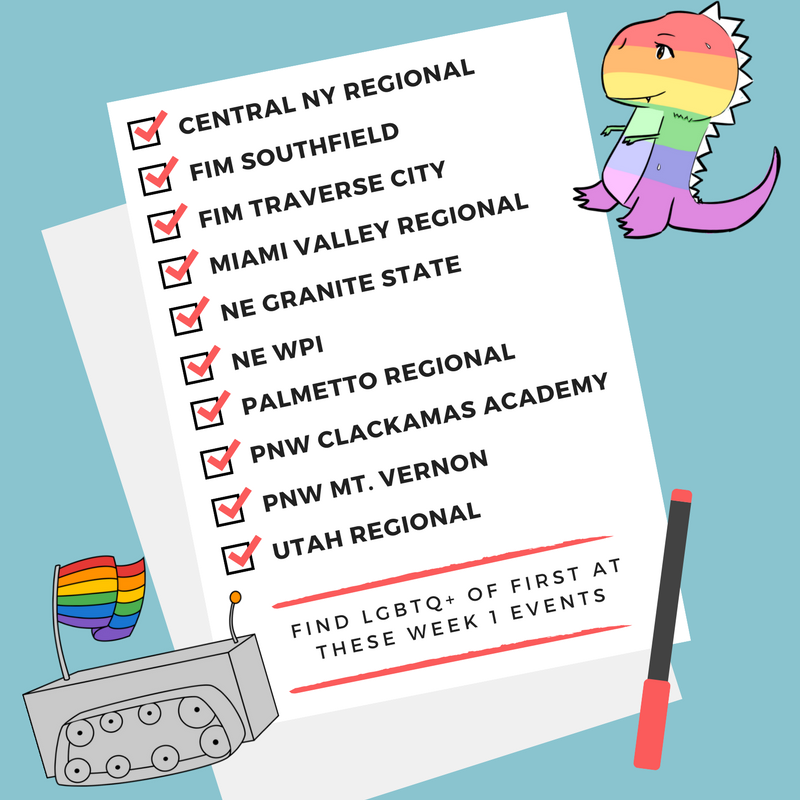
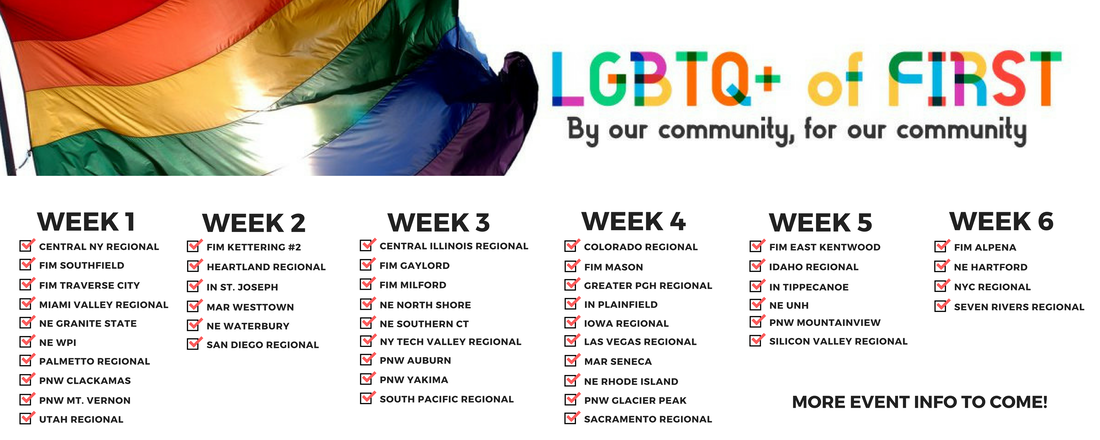
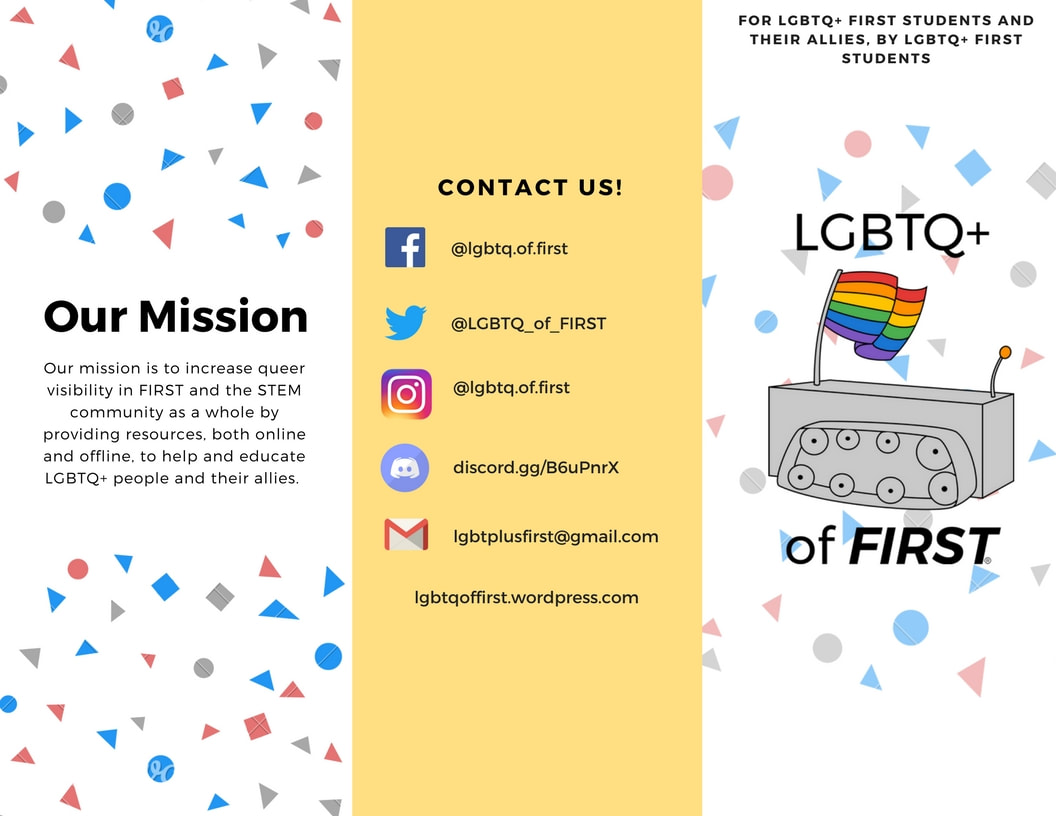
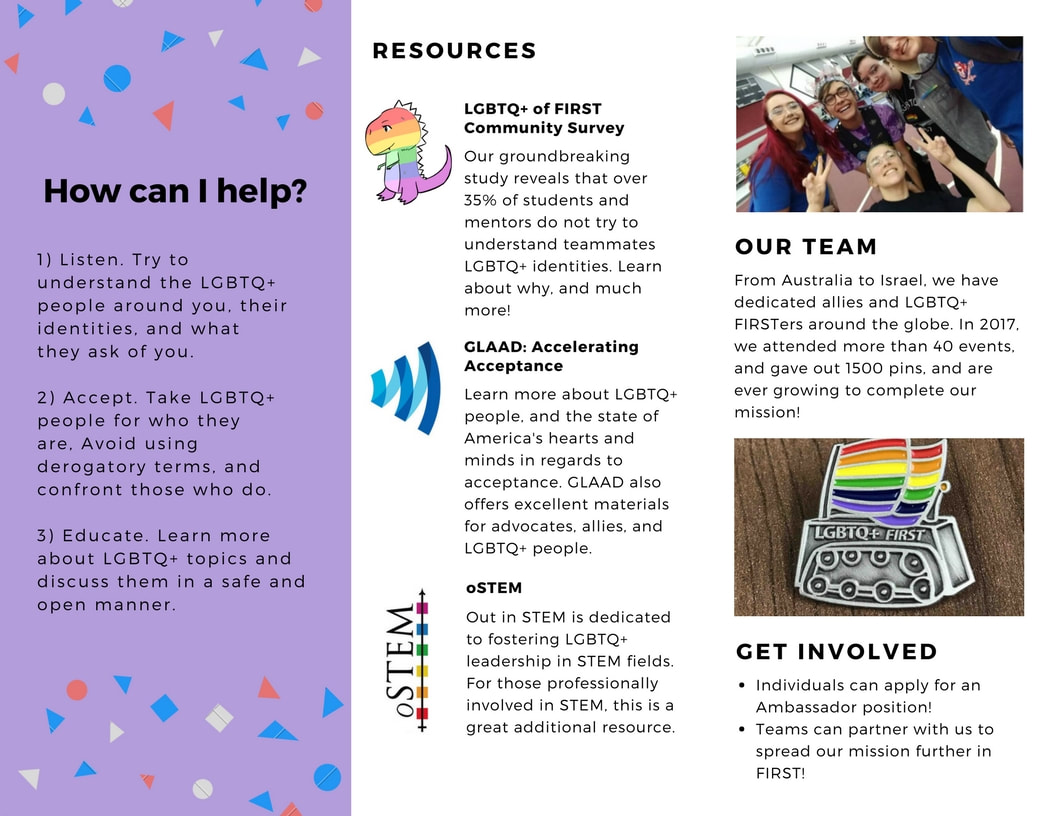
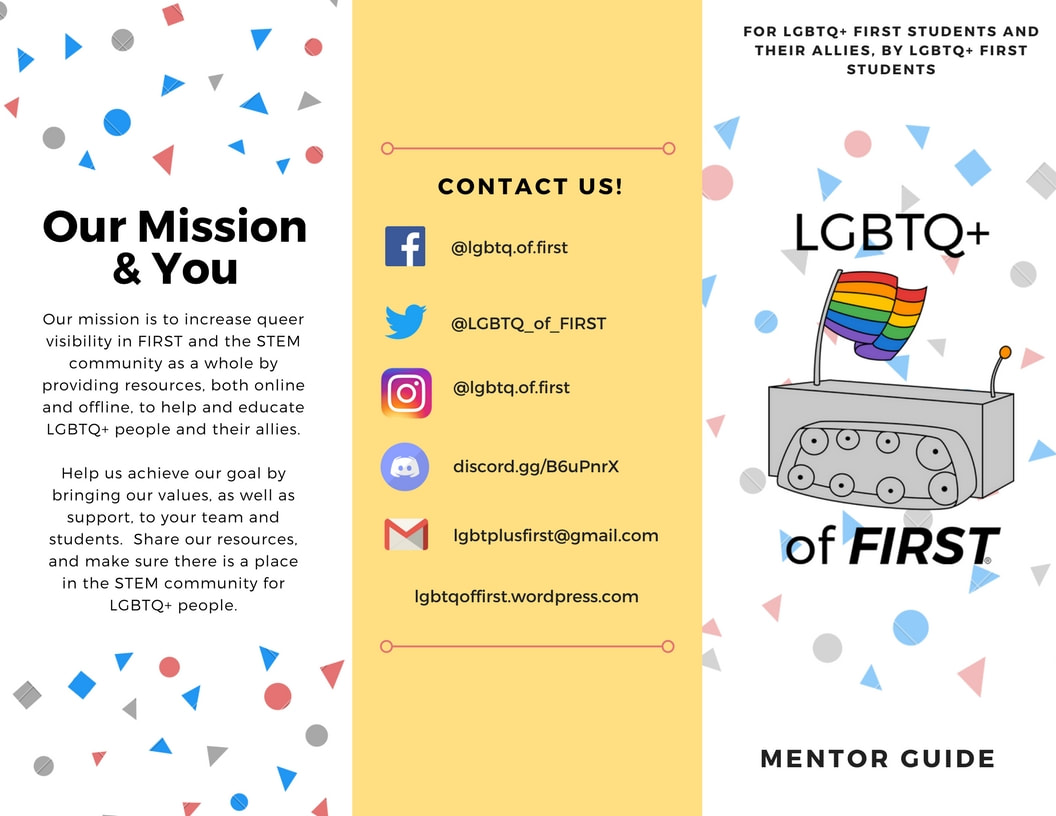
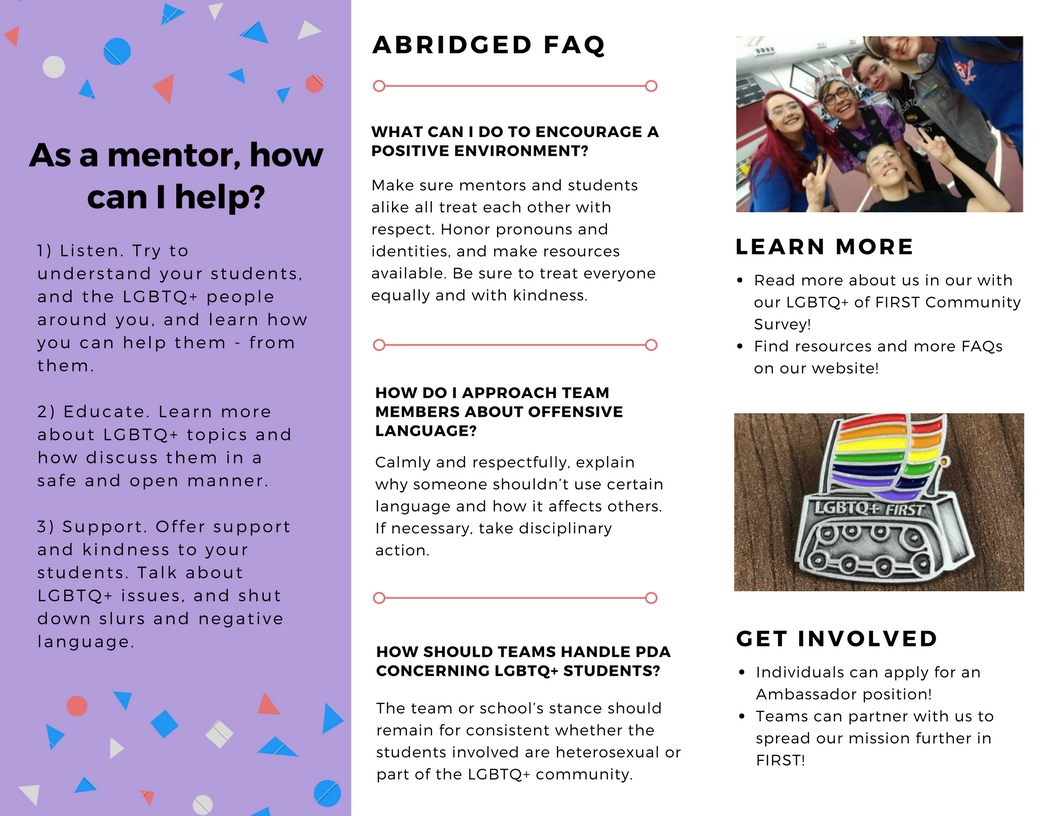
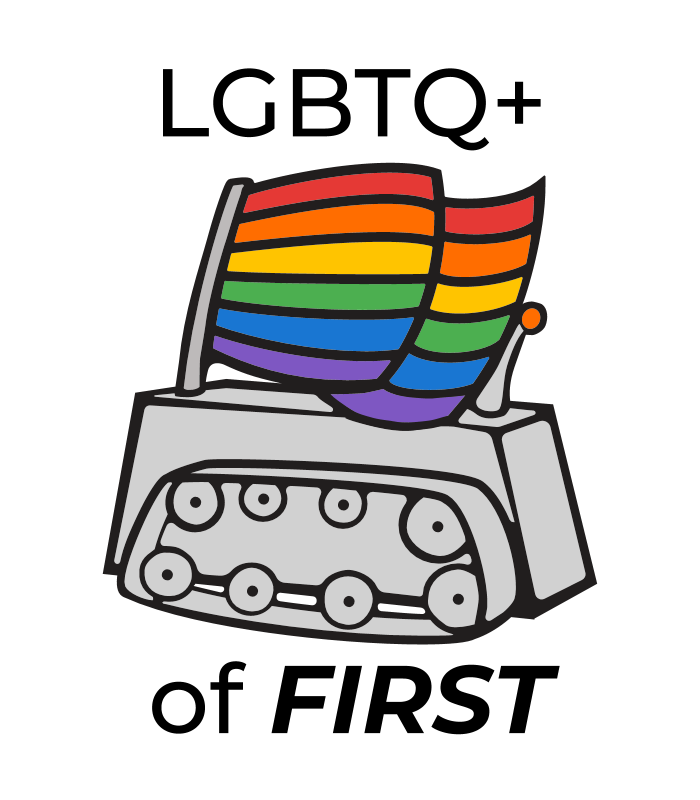
 RSS Feed
RSS Feed
